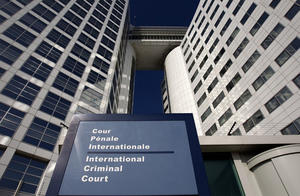ICC: Hopes for Justice Set Back
Prosecution Withdraws Kenyatta Charges
The International Criminal Court (ICC) action to drop charges against President Uhuru Kenyatta of Kenya sets back efforts to end the country’s entrenched culture of impunity, Human Rights Watch said.

The entrance of the International Criminal Court (ICC).
On December 3, 2014, the ICC’s judges turned down a prosecution request for further delay to try to get records from an uncooperative government in Kenya. The judges gave the prosecution one week to indicate whether it had sufficient evidence to go to trial or to withdraw the charges. On December 5, the prosecution stated it did not have the evidence to prove Kenyatta’s alleged criminal responsibility beyond a reasonable doubt.
“It’s clear that Kenya’s long tradition of impunity and pressure on witnesses have been serious obstacles to a fair process before the ICC,” said Elizabeth Evenson, senior international justice counsel at Human Rights Watch. “But these roadblocks make it all the more important for the ICC to assess how it can move ahead with high-profile cases against powerful people accused of serious crimes.”
ICC judges charged Kenyatta in January 2012 with crimes against humanity for his alleged role in organizing and financing murder, displacement, and rape during Kenya’s 2007-2008 post-election violence. In early 2014, as a February trial date neared, the prosecution admitted its investigations had hit a dead end, including because a key insider witness had confessed to giving false testimony.
In March, the judges had granted a temporary adjournment in the trial to permit the prosecution and the government of Kenya to work together to resolve a long-outstanding request for Kenyatta’s financial and other records, which the prosecution hoped could provide additional evidence. When the vast majority of records had still not been produced by October, the prosecution asked the judges to refer Kenya to the ICC’s Assembly of States Parties for non-cooperation, and adjourn the case indefinitely until the government complied.
The defense petitioned the judges to close the case. In two decisions on December 3, the judges found that further delay – particularly since the prosecution was uncertain whether even full cooperation by the government would lead to sufficient evidence – would be incompatible with the interests of justice. While the judges faulted Kenya for not complying with its obligations to assist the prosecution, they decided against any formal finding of non-cooperation, which could result in the ICC’s Assembly of States Parties deciding on what enforcement action to take on non-compliance.
“The judges made clear that Kenya’s inaction compromised the search for justice,” Evenson said. “The case should prompt serious discussion for future cases about what the court can do if the government of the country involved won’t cooperate.”
The trial before the ICC of Kenya’s deputy president, William Ruto, and the former radio broadcaster, Joshua arap Sang, in a related, but separate, case will continue. The prosecution’s decision on December 5 does not preclude it from bringing fresh charges if it secures new evidence.
Source: Human Rights Watch
- 332 reads
Human Rights
Ringing FOWPAL’s Peace Bell for the World:Nobel Peace Prize Laureates’ Visions and Actions

Protecting the World’s Cultural Diversity for a Sustainable Future

The Peace Bell Resonates at the 27th Eurasian Economic Summit

Declaration of World Day of the Power of Hope Endorsed by People in 158 Nations

Puppet Show I International Friendship Day 2020

